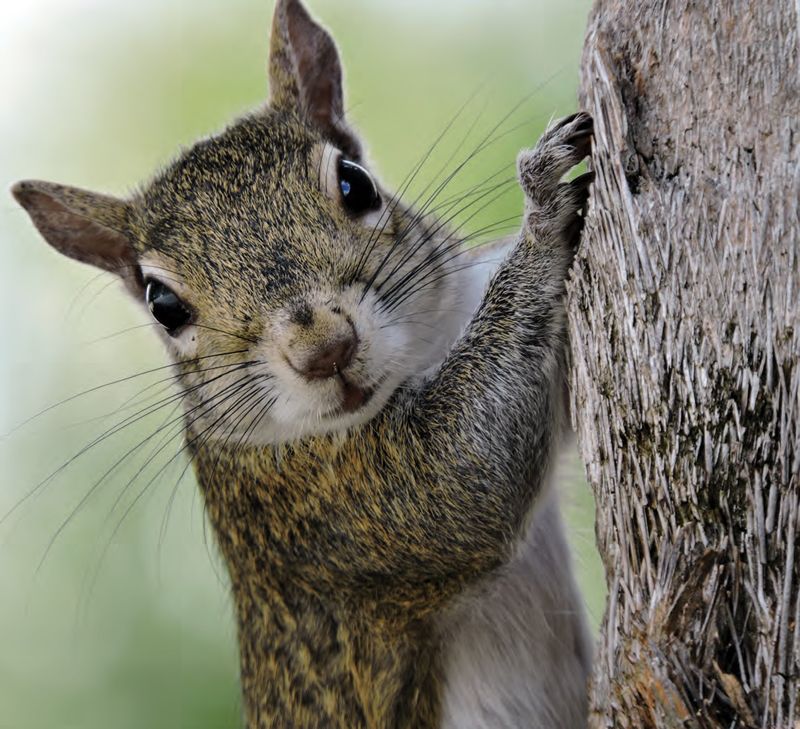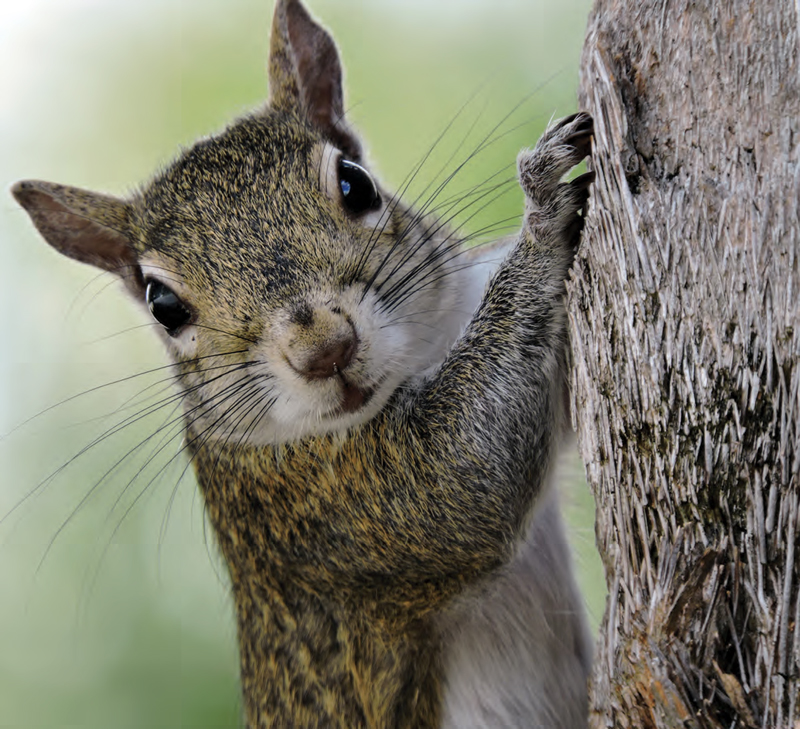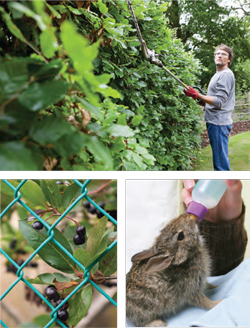Critter Control | Keeping Wild Creatures Out of Your Home


Rabbits, squirrels and foxes are fun to watch romping in your yard; birds and even snakes can be interesting to view from a distance, but when these creatures venture inside your house, they are at the least a nuisance and in some cases scary to discover. It becomes even worse when they move in and decide that your home is now theirs. Bats and squirrels love attics; snakes and rodents wiggle into basements and garages. How do we protect our homes and keep the wildlife at bay? What do we do when we find one of these creatures has ventured into our home? We want to be kind to these wild critters, but we have to be firm that their home is not inside ours.
Ideally, you want to humanely deter and prevent creatures like raccoons, squirrels, groundhogs, skunks, mice, and bats from gaining entry into your home in the first place. Routinely inspect your home for openings, starting from the ground up. Foundation cracks or rotting boards on your home are an easy way for creatures to slip inside. Even small gaps pose a risk, as rodents and snakes can squeeze into tiny openings, so you’ll want to be sure they’re sealed or repaired. If you need help from an expert dealing with this yard problem, get some help at https://www.pestcontrolexperts.com/.
Decks make good cover for rabbits, groundhogs, raccoons, chipmunks and mice to create dens and tunnel under your property. Keeping ¼- or ½-inch galvanized hardware cloth tightly secured around the base of decks and sheds makes access difficult for these animals. Attach the hardware cloth firmly to the foundation with staples or nails, leaving about six to 12 inches to overlap the ground. Bury the remaining hardware cloth a few inches underground, bending it outward so that any creature that tries to dig beneath the barrier will run into the obstacle. Once secured, you can paint it to match the foundation, or disguise it with lattice or foundation plantings if desired.
Check for vines that grow onto the house—animals like to nest in the area between the house and the ground where the vegetation grows. Birds and squirrels can access the upper floors and get into attics and under the eaves, so make sure the roofline is tightly sealed to the soffit. If squirrels or other creatures have entered your attic, the best plan of action is to wait until they leave to forage for food and close off the entrance.
Chimney caps are a must for keeping varmints such as bats from using the chimney as their entrance. If your chimney cap appears damaged, or you don’t have one, it’s best to hire a professional roofer. He can check out the condition of your current chimney cap and repair it, or install a new one if needed.
After inspecting the immediate vicinity of your home, take a look around your property. Walk your lot looking for holes and tunnels in the ground which may extend near your house. If your yard has any large, old rotten stumps, be aware that raccoons and skunks often build dens down inside these decaying mounds. Raccoons are notorious garbage scavengers and are dangerous to small pets, while skunks and dogs seem to find each other with regularity, so it’s best not to provide these creatures with a habitat in your backyard. Hiring a London Pest Control team can ensure that your pest problem is conquered once and for all.
While walking your property, if you notice significant amounts of scat or a heavy overgrowth of foliage, it is a good idea to investigate further. Pests can make their home in the garden and then move into the basement or attic during cold months, potentially bringing fleas, lice or ticks with them. There are Chewables that can prevent that from happening.
Be sure to stack wood away from your home. Often the garage or the side of the house seems like a good spot for easy access to firewood, but woodpiles attract mice, chipmunks, and other rodents, which in turn attract snakes. These creatures make their homes in woodpiles. Don’t keep anything stacked or leaning up against your house—you can’t see what’s in there, and its occupants may burrow into your siding or surprise you when you lean over to pick up some firewood. Either way, this is not a good idea. Stack firewood or any brush piles out in the yard for safety
Other good habits to keep wildlife from getting too close to your home and property are simple, not feed wildlife. Pet food left uneaten attracts animals, so keep bowls clean and empty if your pets eat outside. Keep trashcan lids secured; if you use metal cans, use lid latches. Keep tree branches pruned back from your roof and exterior walls so that squirrels and birds don’t have easy access to your home. Pick up fruit that drops from trees and put it in the compost bin or trash cans. If you have beehives or a vegetable garden, proper fencing will discourage animals from feeding there. If you do discover an animal in your home and you can’t convince them to vacate or they pose a danger, you can get help from professional wildlife removal services such as Blue Ridge Wildlife and the #1 Pest Control in Philadelphia | Top Exterminator for Rodents!
They have staff trained in wildlife biology and related specialties, and can safely remove creatures from your property, repair any damage, and show you how to keep undesirable wildlife from encroaching on your property in the future. Be aware that Virginia law prohibits relocating wildlife, so dangerous or nuisance animals must be trapped by an animal removal and pigeon control company.
 If you find an injured animal or an abandoned nest of baby animals on your property, Southwest Virginia Wildlife Center of Roanoke can help. They cannot remove critters unless they are sick, hurt, or abandoned babies, but these situations do occur in your yard or even in your home. Their mission is to rehabilitate animals and release them back into their native habitat. In case they are just affecting your crops, we recommend to hire the pest control maine service as they can help even if the critters are not sick.
If you find an injured animal or an abandoned nest of baby animals on your property, Southwest Virginia Wildlife Center of Roanoke can help. They cannot remove critters unless they are sick, hurt, or abandoned babies, but these situations do occur in your yard or even in your home. Their mission is to rehabilitate animals and release them back into their native habitat. In case they are just affecting your crops, we recommend to hire the pest control maine service as they can help even if the critters are not sick.
Your home is a valuable possession and you want to keep it in good shape. It’s easy to ignore critters or view them as cute, this pest control company suggests you get the problem fixe right away, they can pose a significant danger. If they invade and are left alone they can cause expensive damages as well as spread disease. Especially during spring, many creatures produce offspring and are looking for places to nest. Keeping a close eye on your home’s exterior and surroundings is the best way to make sure their nests are made in the great outdoors and not in your home. Contact local pest control services if you encounter these creatures at home.
bats, chipmunks, Current Issue, foxes, groundhogs, humane, mice, pests, rabbits, raccoons, snakes, squirrels, wild animals






